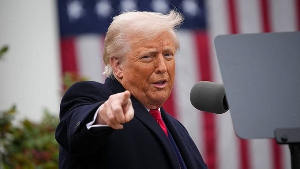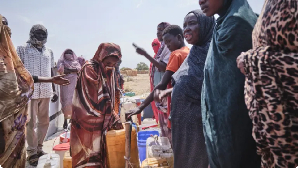... what goes around, comes around
Ho, April 13, (Chronicle) -- Dr. Albert Kan Dapaah, minister responsible for Communication and Information Technology, has revealed that he wouldn?t have joined the ?Kume Preko? demonstrations that kicked against the Value Added Tax (VAT) if the then ruling National Democratic Congress (NDC) government had been a little bit more transparent with the problems facing the energy sector at the time.
He conceded also that some of the arguments he made in parliament when he was the Shadow Minister for Energy as an opposition in parliament were laced with party political cosmetics.
And based on that reality and ?experience?, he called on all Ghanaians of today to consider the future of the country first before any other considerations, especially when it comes to commenting on government policy.
The humble-looking minister and Member of Parliament (MP) for the Afigya-Sekyere West constituency made the sober ?confessions? in Ho, the Volta regional capital on Tuesday, during the People?s Assembly at the Municipal conference hall, where he gave a presentation on petroleum pricing.
He said since the early days of the NDC rule, petroleum pricing had been a problem, but politicians on both sides of the divide were so short-sighted that, they deemed the problem as that of the Ghana National Petroleum Corporation (GNPC), instead of a national one.
The former energy minister said the NDC-led government was so unfortunate that at the latter part of 2000, oil prices greatly fluctuated while, at the same time, the world prices of Cocoa and Gold dropped sharply alongside their tonnages.
He hinted further that the government of the time subsidized fuel prices with loans from the Ghana Commercial, Barclays and Standard Chartered banks, which resulted in ?3.2 trillion being gulped down in subsidy at the end of 2000. Even though he did not condemn the action, Hon. Dapaah said the rippling effect of that borrowing was the 40% inflation rate the country suffered at the tail end of the NDC regime.
?If the NDC had published the figures and told Ghanaians the truth, maybe I wouldn?t have taken part in the demonstrations,? he told the packed hall of participants.
Another near confession the minister made, albeit jokingly, was to the effect that having seen the reality of the game, he usually replied his NDC colleagues during discussions outside parliamentary sessions that, he hadn?t known at the time he was criticizing that the word ?AFFORDABILITY?, which he trumpeted so loudly, had two fs.
Explaining why it had become necessary to fall on deregulation of the petroleum sector, which he stressed was the brainchild of the NDC?s Ato Ahwoi, Dr. Dapaah said vehicles alone consume nearly 70% of the fuel refined from imported crude oil, while industry took 30%.
He said as if by coincidence, 70% again of all vehicles in the country are private cars, and argued that continuous subsidy of fuel would mean making life more comfortable for the already rich in the society and at the same time piling debt for the whole nation.
The minister again conceded that as a matter of fact, the actual deregulated price of fuel is less than the ?30,000 government fixed price, but quickly explained that in an attempt to make kerosene and premix more affordable for the rural poor, and Liquefied Petroleum Gas (LPG) cheaper for workers, it became extremely necessary to slap the difference on premium.
?The only new tax we introduced was the Social Impact Mitigation Levy (SIML), which is aimed at importing more buses into the country to bring foodstuff from the hinterland and carry people to their work and market places. This idea is to mitigate the social impact of the deregulation programme,? he noted.
The chartered accountant found it unacceptable that government should use 75% of last year?s total revenue earnings of ?17.4 trillion to service debts and pay the annual salaries of only government workers, who he noted, numbered just one million out of the 20 million total population of the country.
He concluded that such a policy would be at the expense of the provision of schools, hospitals, roads and basic infrastructure for the people.
Present at the assembly were Capt. (Rtd) Nkrabeah Effah-Dartey, deputy minister for Interior, Dr. Gladys Ashitey, deputy minister for Health, Hon. Kofi Dzamesi, Volta regional minister, and his deputy, Joseph K. Nayan.
General News of Thursday, 14 April 2005
Source: Chronicle












